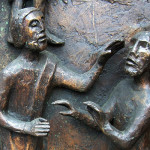We run our website the way we wished the whole internet worked: we provide high quality original content with no ads. We are funded solely by your direct support. Please consider supporting this project.
When You Doubt the Bible
Many people enter into conversations with ReKnew and Greg’s writings because they have questions and doubts about the Bible which they do not feel they can ask within their current church tradition. When they arise, and they will, what do we do with them? How do we process them in a healthy way? The following is an excerpt from Greg’s latest book Benefit of the Doubt where he shares how he shifted from engaging the Bible as a house of cards to engaging the Bible in order to relate to the foundation of the Bible, Jesus Christ:
“Have you ever seen a really intricate house of cards? They are structures that are erected by leaning playing cards against one another. … The house as a whole depends on each and every card staying in place. If any card is removed, the whole thing collapses.
This is quite a bit like the way my early faith was held together, and I’ve found that it’s more or less the way most evangelicals embrace faith. … If any [beliefs] were removed, the whole edifice of our theology flattened out like a pancake.
The same thing can be applied to Scripture. … I was taught that if the earth was not created in six literal days and if Adam and Eve were not literal, historical people, then the whole Bible may as well be a book of lies. Flick this one card out, and the whole structure of faith collapses. When I began to question how old the earth was and how humans came into being, I may as well have been calling into question the historical evidence of Jesus.
And the same thing applied to every single passage of Scripture. Since we were taught that it had to be absolutely “inerrant” to be God’s Word, our faith in it could be destroyed by one verse being proved to contain a mistake. The Bible was itself a house of cards. …” (157-158)
From a House of Cards Faith to The Foundation of Christ
“The all-important center of the Christian faith is not anything we believe; it’s the person of Jesus Christ, with whom we are invited to have a life-giving relationship. … Everything began to change for me several decades ago when I began to realize that I didn’t need to rely on the Bible as the inspired Word of God in order to enter into this relationship with Christ. Rather than believing in Jesus because I believe the Bible to be the inspired Word of God, as evangelicals typically do, I came to believe the Bible was the inspired Word of God because I first believed in Jesus. This is how I now encourage people to structure their faith, for I have found it to be a much surer intellectual foundation for my faith than the conviction that Scripture is the Word of God. …” (159)
“Whereas Islam has always presented itself as a ‘religion of the book,’ the kingdom of God has been from the start a movement that is centered on a person. The only foundation that can be laid, Paul says, for example, is ‘the one already laid, which is Jesus Christ (1 Cor. 3:11). …
The earliest disciples certainly believed the Old Testament was inspired, but they never based their faith in Christ on this. They used it extensively, but only as a means of pointing people to Jesus, whom they already believed in for other reasons. This is the rule that I believe the Bible, which now includes the New Testament, should play in our lives. …
Hence, I don’t see beliefs rooted in Scripture as an end in and of themselves. They rather point us to Jesus and help bring us into, and strengthen us in, our relationship with Jesus. The moment we begin to think that Scripture or our beliefs are ends in and of themselves, we are in danger of making an idol of Scriptures and our beliefs” (163).
Category: General
Tags: Benefit of the Doubt, Bible, Doubt, Faith
Related Reading

Quotes to Chew On: Conflicting Depictions of God
“This is something like the way I believe we should respond when we encounter biblical narratives that depict God doing things we can’t imagine Christ doing. For example, I can’t for a moment imagine Jesus—the one who made refusing violence and loving enemies a condition for being considered a child of God—commanding anyone to mercilessly…

The Cross and the Witness of Violent Portraits of God
In my previous post I noted that the prevalent contemporary evangelical assumption that the only legitimate meaning of a passage of Scripture is the one the author intended is a rather recent, and very secular, innovation in Church history. It was birthed in the post-Enlightenment era (17th -18th centuries) when secular minded scholars began to…

A Rational Defense of Belief in God
The New York Times recently posted a review of Alvin Plantinga’s book, Where the Conflict Really Lies: Science, Religion, and Naturalism. In it, Plantinga argues on philosophical grounds that, among other things, theism is not in conflict with science, that a belief in naturalism along with evolution is contradictory, and that “Faith…is another basic way of forming beliefs, distinct…

History and Bible: Do They Align?
To begin, it is significant that when Jesus and the authors of the NT referred to their sacred writings as “God-breathed,” they were referring to the writings that had been handed down to them. So too, the text that the Church has always confessed to be “God-breathed” has been the canon she received. Never has…

Why Doesn’t God Heal When We Ask?
If we are called to manifest what Jesus manifested and revolt against what Jesus revolted against, and Jesus carried out the kingdom through healing, then why doesn’t God heal those we pray for? One of my personal kingdom heroes is a Vietnamese lady named Dr. Huyen Tranberg. She is a medical doctor who works with…

